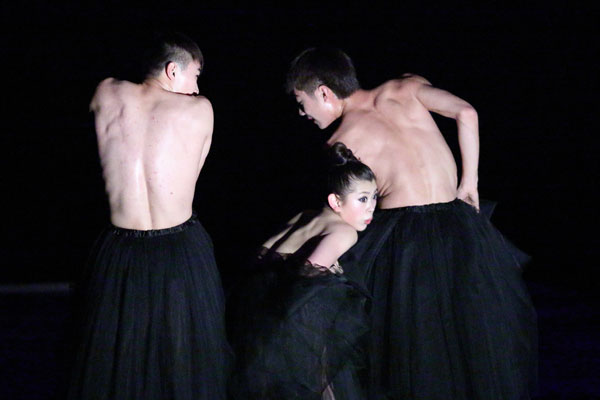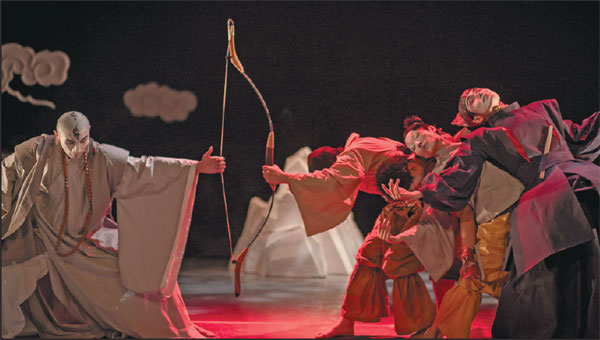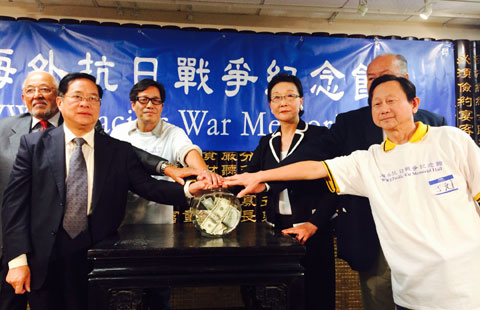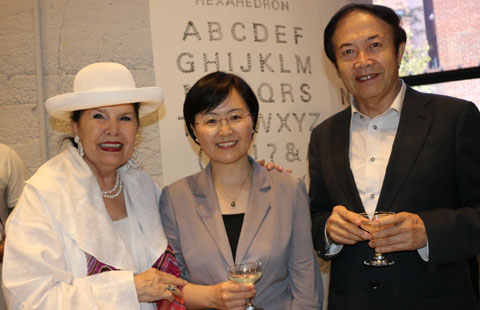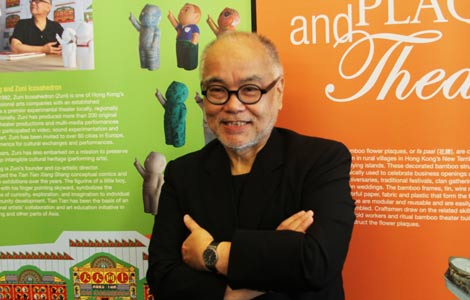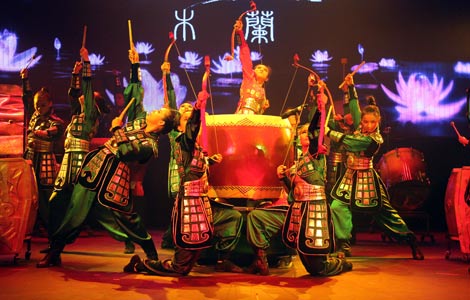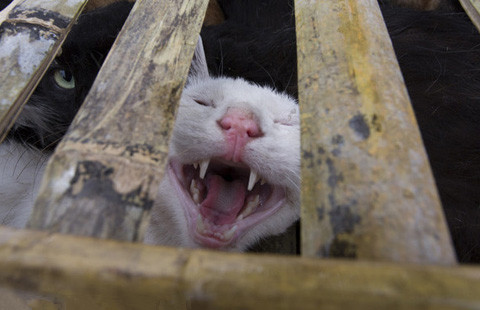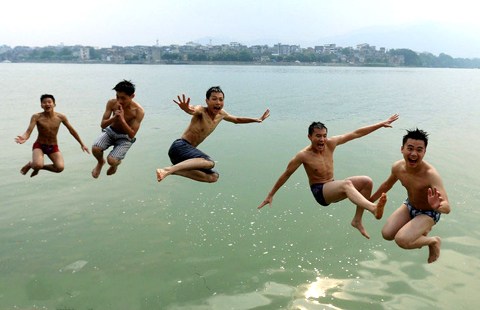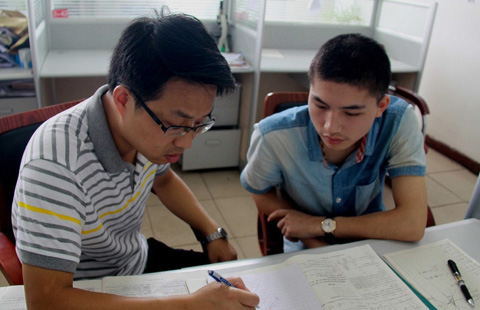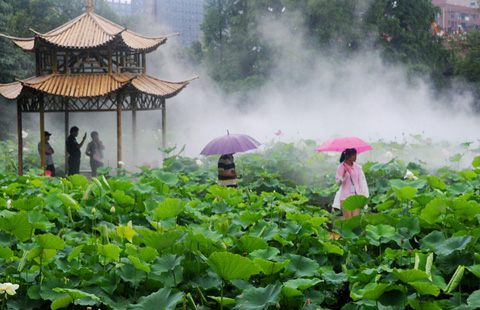Decade of dance
Updated: 2014-07-08 07:09
By Chen Nan (China Daily USA)
|
||||||||
It will be a school reunion like no other when graduates from the modern dance program at the Beijing Dance Academy get together to showcase the skills they have honed over the past 10 years. Chen Nan reports.
Wu Yandan is attending a school reunion in July - the first one since her class graduated from the Beijing Dance Academy in 2004.
Instead of discussing marriage, children, or divorce, Wu asked her classmates, "Can I dance with you again?"
|
The modern dance production Have Fun is choreographed by Sun Zhuzhen, one of the country's first formally trained dancers. Photos Provided to China Daily |
|
Tea Illusion, choreographed by Zhao Liang, is an interpretation of Chinese tea culture through body movements. |
As one of 28 graduates from the modern dance class, the first and only four-year modern dance program (Guangdong branch) of the Beijing Dance Academy, Wu, along with nine of the classmates, will celebrate the reunion in a special way by presenting a show titled Ten Years on July 25 and 26 at the National Center for the Performing Arts in Beijing.
Over the past 10 years, Wu and her classmates have been working in the field of modern dance, which is considered avant-garde and is largely overlooked by mainstream audiences.
"I feel a little bit weird standing here," says Wu, the 32-year-old choreographer who is an independent artist based in Shanghai. "We have been performing in galleries, small theaters and public spaces. Venues like the NCPA are not our forte. I have never watched a show here, let alone performed here," she says.
The idea for the 10-year reunion show came from Yang Meiqi, known as the "mother of modern dance in China", who founded the Guangdong Modern Dance Company, arguably China's first modern dance company, in 1992.
"Ten years gives witness to how they have evolved and contributed to modern dance independently," says Yang, 70. "I am pleased to see some of them are still working in the field of modern dance. I also feel sad because after all those years, modern dance in China is still slow to develop."
Yang says there are only about 200 professional modern dancers and choreographers in China.
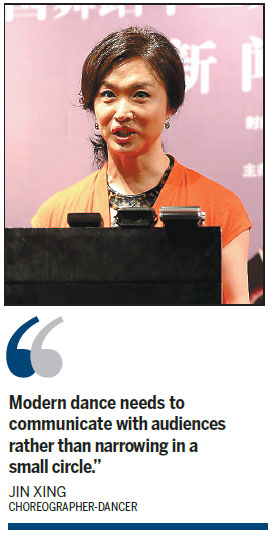
She says that modern dance has never been considered a serious art form in China and still struggles for respect.
One of her major concerns is that some dances have become "cheap entertainment".
"Art should guide people's thoughts. But what we have now are girls wearing less clothes to attract eyeballs and stages that are decorated as extravagantly as possible. Everything is about money and bringing in audiences," she says.
She is comforted, however, by the positive feedback from many audiences. There are some modern dance fans, whose support helps people like her survive.
Qu Jiabo is a modern dance fan. The 32-year-old woman, who moved from Haikou, Hainan province, to Beijing in 2006, works as a marketing manager. In 2011, she started taking part in the weekly modern dance class organized by Beijing LDTX Modern Dance Company, an independent professional dance company founded by Willy Tsao in 2005.
A dance lover since childhood, Qu first studied modern dance out of curiosity while pursuing her master's degree at Lancaster University in the United Kingdom.
During the upcoming annual Beijing Dance Festival, a two-week program launched by Beijing LDTX Modern Dance Company, workshops will be taught by international modern dancers, and there will be performances by professional and amateur dancers.
Qu will perform a work, choreographed by Liao Sidi from Beijing LDTX Modern Dance Company.
According to Tsao, who is also the founder and artistic director of City Contemporary Dance Company in Hong Kong, bringing audiences close to modern dance is important for the development of the art form.
"Hong Kong has more than 40 modern dance companies. Modern dance shows are available every weekend. But on the Chinese mainland, modern dance companies have to tour abroad to make ends meet, and audiences have nowhere to watch high-level modern dance shows," Tsao says.
Jin Xing, choreographer, dancer, actress and TV host, who founded the Jin Xing Dance Theater in Shanghai in 1999, credits Yang with introducing modern dance to her.
"Some people asked me why I am still dancing. I said I feel most confident when I am dancing," she says.
"Modern dance needs to communicate with audiences rather than narrowing in a small circle."
The 47-year-old is one of the judges of a popular dance show on Zhejiang Satellite TV Station, the Chinese version of American reality TV show, So You Think You Can Dance. Jin says that such TV shows help popularize modern dance among mainstream audiences.
"The current development for modern dance in China is slow. We have to work together and figure out a way for it to grow," she says.
Contact the writer at chennan@chinadaily.com.cn
(China Daily USA 07/08/2014 page8)
Most Viewed
Editor's Picks

|

|

|

|

|

|
Today's Top News
Chinese envoy: 'Time is ripe' for BRICS' bank
China, US to discuss monetary policy
`God father’ of HK art honored for Smithsonian exhibit
IBM to try to curb Beijing's pollution
Double agent 'contradicts' trust with US
China urges US to stop abusing remedy measures
Guo Degang to buy US network?
WWII memorial announced for Bay Area
US Weekly

|

|
